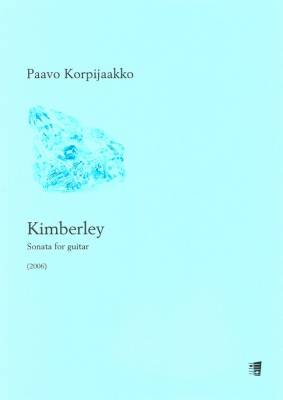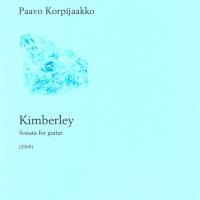Kimberley - Sonata for guitar
Korpijaakko, PaavoTuotetiedot
| Nimeke: | Kimberley - Sonata for guitar | ||
| Tekijät: | Korpijaakko, Paavo (Säveltäjä) | ||
| Tuotetunnus: | 9790550118997 | ||
| Tuotemuoto: | Nuotti | ||
| Saatavuus: | Toimitusaika 7-16 päivää | ||
| Ilmestymispäivä: | 12.1.2024 | ||
| Hinta: | 23,74 € (20,92 € alv 0 %) | ||
|
|||
| Kustantaja: | Fennica Gehrman |
| Painos: | 2024 |
| Julkaisuvuosi: | 2024 |
| Kieli: | englanti, suomi |
| Sivumäärä: | 21 |
| Tuoteryhmät: | Muut soittimet Kitara |
| Kirjastoluokka: | 78.65 Kitara |
| Avainsanat: | kitara, kitarasonaatit |
Linkkejä
Muut formaatit tai variantit

|
Ladattava digitaalinen julkaisu, 2024 |
18,99 €
|
Paavo Korpijaakko's (b. 1977) guitar sonata Kimberley was composed in 2006 and dedicated to Petri Kumela. It is Korpijaakko's fist piece for the guitar, and the composers gives credit to the commissioner, who "untiringly and long-sufferingly solved the challenges posed by the musical ideas and conjured forth timbral shades". Including a tribute to Debussy, a playful scherzo and some shameless flirting with a flamenco the four movement sonata arrives at a spectacular conclusion.
Duration: 21'
Korpijaakko studied at the Tampere Conservatory 1997-2007, majoring in composition from 2001 onwards. For most of the time he was a pupil of Jouni Kaipainen, but he was also taught by Juhani Nuorvala and Hannu Pohjannoro. Korpijaakko stresses the importance of harmony, resonant material and harmonic hierarchy, by which he means harmony as a fundamental progressive element of the piece. His aim in handling his motifs is to use his material sparingly. In this respect he specifically wants to be a kindred spirit to Beethoven. Everything that will later appear in the work must be derived from the core thematic and harmonic elements - or whatever one likes to call them. Most important is, however, to create a steady stream of interesting music.
Duration: 21'
Korpijaakko studied at the Tampere Conservatory 1997-2007, majoring in composition from 2001 onwards. For most of the time he was a pupil of Jouni Kaipainen, but he was also taught by Juhani Nuorvala and Hannu Pohjannoro. Korpijaakko stresses the importance of harmony, resonant material and harmonic hierarchy, by which he means harmony as a fundamental progressive element of the piece. His aim in handling his motifs is to use his material sparingly. In this respect he specifically wants to be a kindred spirit to Beethoven. Everything that will later appear in the work must be derived from the core thematic and harmonic elements - or whatever one likes to call them. Most important is, however, to create a steady stream of interesting music.








